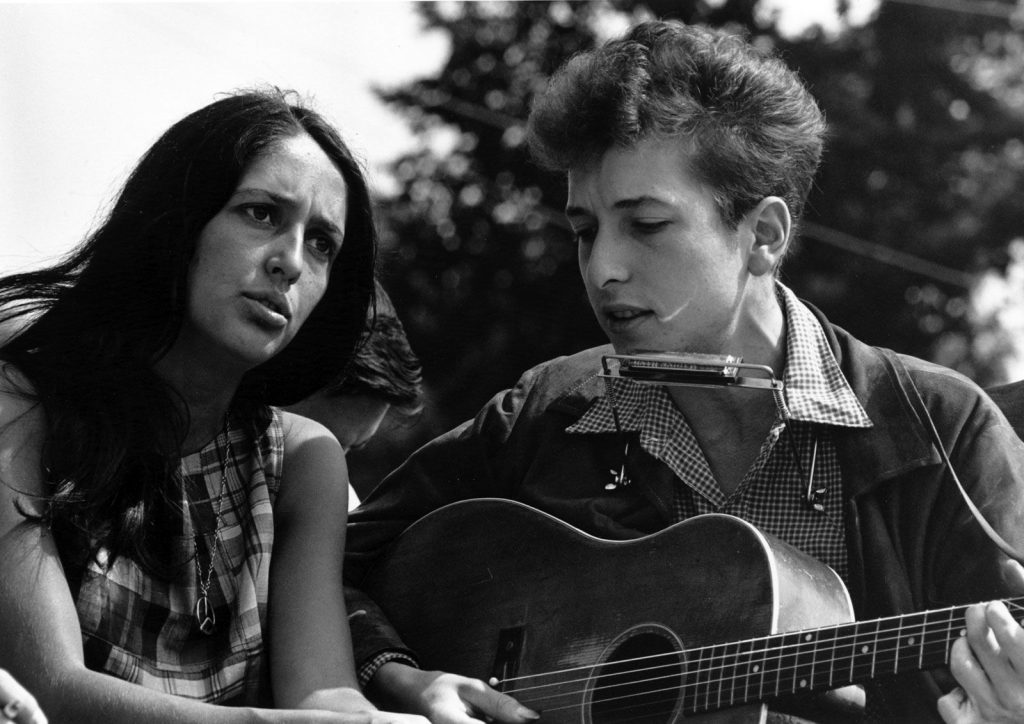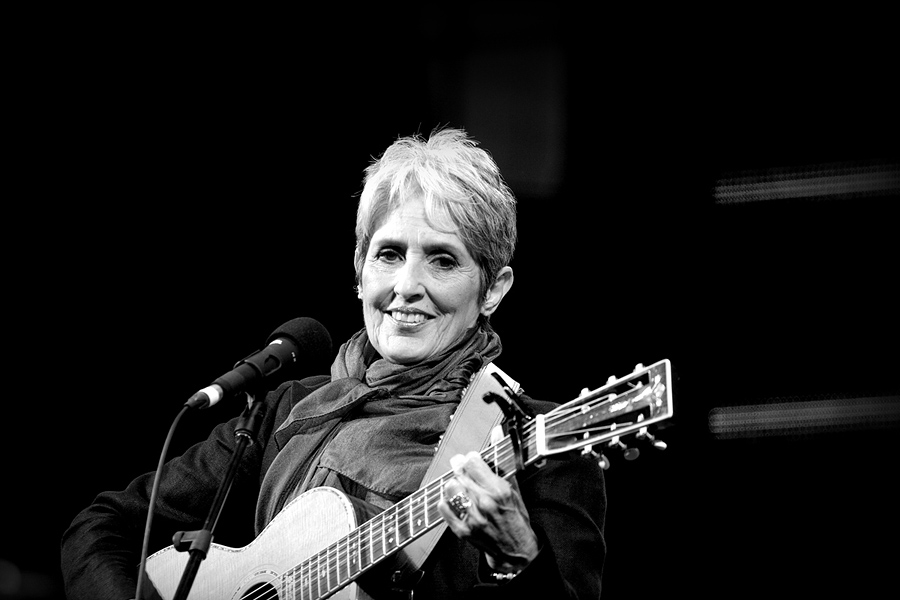Ten Solo Living Artists were inducted into the Folk Americana Roots Hall of Fame (FARHOF) over the weekend of April 19 and 20, 2024 at the Boch Center in Boston. The ten inductees are Willie Nelson, Ramblin’ Jack Elliot, Mavis Staples, Taj Mahal, Joni Mitchell, Emmylou Harris, James Taylor, Bonnie Raitt, Bob Dylan, and Joan Baez.
Joan Baez was born on January 9, 1941, in Staten Island, NY to a Mexican-American physicist father and a Scottish drama teacher. The family, which included two other daughters, traveled extensively before settling in Southern California when Joan was in her early teens. She managed to acquire a little formal musical training despite all the moves and learned to accompany herself on guitar.
She released her first solo album of traditional folk songs, Joan Baez, in 1960. Some critics thought her clear soprano voice was “too pretty.” Others thought it flowed purely “with wondrous ease.” Either way, her youthfulness and activist nature were right for the times. She was soon at the forefront of the folk revival of the early 1960s.
It is fitting that Joan Baez and Bob Dylan were inducted into the FARHOF at the same time. While Dylan’s talent likely would have brought him recognition and celebrity, there is no denying Joan was instrumental in launching his career. She introduced her audience to his music and included Dylan’s “Don’t Think Twice It’s Alright” and “With God On Our Side” on her fourth album.

The two were in a relationship from 1963 to 1965 and are said to have been virtually inseparable. The relationship was particularly hard on Joan. She told Amanda Petrusich of New Yorker last year, “He needed a mother, he needed someone to give him a bath, he needed someone to sing his songs.” (Artifacts, September 25, 2023)
The two reconciled in 1975 and sang duets in Dylan’s Rolling Thunder Revue. It was in that same year Joan released her acclaimed album, Diamonds And Rust. The title song was written about her relationship with Dylan. If it sounds bittersweet perhaps putting it out there in song helped her find peace with the way their relationship ended.
Dylan notwithstanding, it was Joan’s rendition of “We Shall Overcome” that put her not only in the forefront of the folk revival of the early 1960s but of the Civil Rights movement as well. It was a time when it was not trendy and certainly not safe to sing about Civil Rights and individual freedom. Yet, Joan’s life’s work was even then reflected in her music.
She could be found singing from flatbed trucks in Mississippi and at the Lincoln Memorial during Rev. Dr. Martin Luther King Jr.’s March on Washington in 1963. She sang at the birth of the Free Speech movement at UC Berkeley, and co-founded the Institute For The Study Of Nonviolence near her home in Carmel Valley. She sang in fields alongside Cesar Chavez and migrant farm workers striking for fair wages, and opposed capital punishment during a Christmas vigil at San Quentin.
For some, her singing “We Shall Overcome” at such a young age may have seemed naïve or youthful ignorance. However, in October 2023 Joan told the CBS Sunday Morning audience she was smart rather than hopeful. “I was smart enough to know that ‘we shall overcome’ did not mean probably in this lifetime,” she said. “So I was dug in. I knew this was going to be a long battle.
She continues the battle even today, not only in the Civil Rights arena but in other fields as well. She supports Amnesty International, the abolition of the death penalty, LGBT rights, various anti-war protests, and environmental causes.
Still, Joan Baez will always be known for her music. Though she has written some notable songs, such as “David’s Song,” “Sweet Sir Galahad,” “One Day At A Time,” and “Diamonds And Rust,” she is better known as an excellent interpreter of songs. This ability enabled her to earn her only gold record for “The Night They Drove Old Dixie Down.” Her Diamonds And Rust album, for example, includes songs written by John Prine, Jackson Browne, Janis Ian, Stevie Wonder, and Dylan. Her 2008 Grammy-nominated album Day After Tomorrow included material written by Steve Earle, Tom Waits, Elvis Costello, T Bone Burnett, Patty Griffin, and others.
Joan bemusedly found her way into the Rock & Roll Hall Of Fame in 2017. When she received word of her pending induction, she is reported to have said, “As part of the folk music boom, which contributed to and influenced the rock revolution of the sixties, I am proud that some of the songs I sang made their way into the rock lexicon.”
Some of those songs she sang that found their way into the rock lexicon include “House Of the Rising Sun” (the Animals), “John Riley” (the Byrds), “Babe, I’m Gonna Leave You” (Led Zeppelin), “What Have They Done To the Rain” (the Searchers), and “Jackaroe” (Grateful Dead).
Joan started her “Fare Thee Well Tour ” in 2018 and performed her final concert in Madrid, Spain, on July 28, 2019. Though she has retired from touring, she is still following the path she forged early in her career. She’s received the Americana Music Association’s Spirit of Americana Free Speech Award, the ASCAP Centennial Award, the Grammy Lifetime Achievement Award, the Kennedy Center Honors, and on and on.
Although Joan has eschewed politics for most of her career, she did endorse Barack Obama for President. More recently, she has supported Kamala Harris and released a short video of “America The Beautiful,” changing “crown thy good with brotherhood” to “crown thy good with sisterhood.”
The folk singer and activist lives on.
Next up – Taj Mahal


